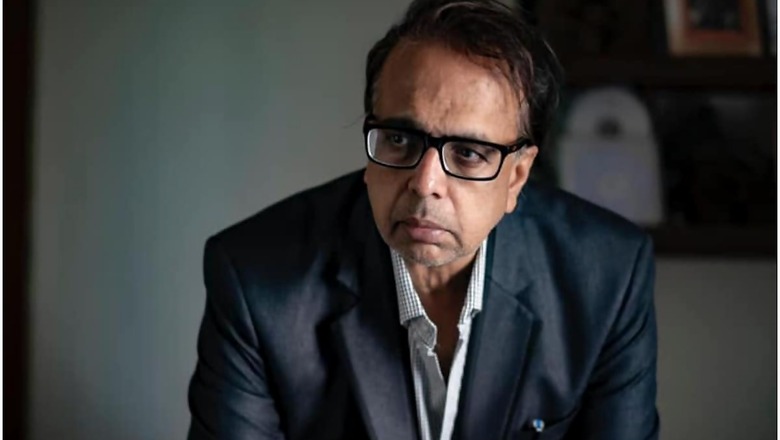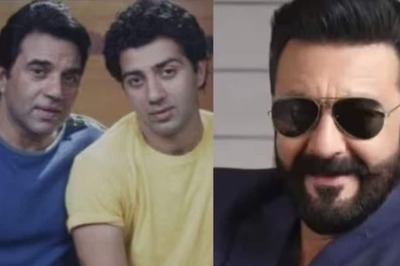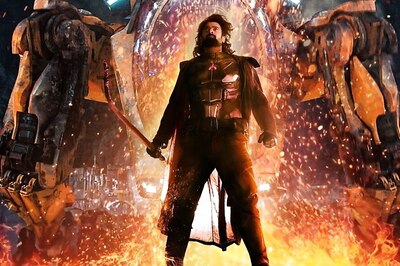
views
Anant Mahadevan, who began his journey as an actor and made his way into directing commercial and socially-oriented films over the course of his career, has witnessed the Hindi showbiz transitioning through many phases. In this absolutely freewheeling chat, he sheds all inhibitions and talks about the good films he made, the bad ones he wants to forget and some dark comedies of his life.
Initiation into cinema
Fortunately, I started doing theatre at the school and college level during inter-collegiate shows. Then you go on to perform at holy places of theatre like Prithvi and NCPA and hone yourself as an actor.
Television started off in ’84 and theatre actors were hired for important parts in the shows. I got a chance to work with Sai Paranjpye in Ados Pados (1985) and she was fresh from the success of Chasme Buddoor. There were our matinee idols like Amol Palekar and Rameshwari too. It was the very first week when Doordarshan went into the sponsored category. Then DD went into Ghar Jamai, The Sword of Tipu Sultan, and so many others, almost seventy till date.
My baptism into films happened with Kim (1984), in which I worked with Sir Peter O’Toole. Then, of course, Khiladi, Baazigar, Badshah, Gardish, and Ishq followed. So, theatre to TV and finally cinema was a quiet, gradual progression.
Ad agency
I saw an ad for a film advertising agency. I applied and got through. I was working with VP Sathe there who used to write a lot of scripts for the great Raj Kapoor. He introduced me to the Film Society Culture, which was an important turning point in my career because Prabhat Chitramandal used to showcase films from all over the world. They would get films from the Pune archive and screen them every Wednesday evening at the Tarabai Hall in Marine Drive and every Sunday morning at the New Talkies cinema in Bandra. IFFI was the only film festival back then and I watched some 30-40 films in a week. I realised that they’re lightyears ahead of us. We did enjoy a Deewar or Amar Akbar Anthony but their films were different, so I decided that whenever I make a film, I would bring certain sensibilities even in the mainstream.
Direction begins
I did Dil Vil Pyaar Vyaar, which incidentally turned out to be the first musical. We used the released works of RD Burman and tried to give those songs a different perspective. Then I did Dil Maange More which was a very irreverent comedy with Shahid Kapoor in the lead. Then I did Aksar with Emraan Hashmi and that became my biggest success because of its suspense and music, but I realised I had to draw a line somewhere. I wasn’t getting to where I wanted.
Staying Alive
I started with an experimental film Staying Alive. There was a really learned writer Sujit Sen, who wrote films like Saransh and Arth, he was a chain-smoker and had a heart attack and landed up in the ICU. On the bed next to him was an underworld guy. Now, Sujit with three attacks was absolutely fearless and the underworld guy with the first attack was totally petrified of death. Sen told me about their conversations, vibes, and sentiments. Sujit ended up changing the underworld guy’s perspective towards life. Saurabh Shukla played the underworld person and I played Sujit in the film. I made the film on the budget of exactly Rs 30 lakh. I think it was my brother who saw the film and asked me, ‘What the hell were you doing before this!’ Since then I am always looking for greater opportunities.
Red Alert, Sindhutai Sapkal and Gaur Hari Dastan
Then I made Red Alert. There was a full-page article about an Andhra cook who was caught in the crossfire between the police and the Naxalites, and how he realised the true meaning of the developments around him.
I read about Sindhutai in a newspaper and it had to be a Marathi film. It won four National Awards, and got Suresh Wadekar, very ironically, his first National Award. After this, I decided that I am not going to succumb to any temptations.
Then I made Gaur Hari Dastan, again about an unsung hero. Rough Book came after this. Again a critical look at India today. It was very strangely backed by a coaching class. Then there have been recent films like Dr. Rakhmabai, Mai Ghat, and Bittersweet. The idea is not to repeat myself.
I am trying to figure out a way to get into the list of world cinema because there is no way we can’t. There have been people like Ray, Ghatak, Adoor, but today the entire cinematic language has changed. My aim is to be ruthless with myself in script selection and execution.
I have survived miraculously so far because of the kind of cinema I make. People don’t allow you to think.
A mistake called Victoria No 203
I have also done a couple of films like Aggar, Anamika, and Victoria No 203 which was probably my biggest mistake. What we thought to be fun initially turned out to be something else. It was a 1972 film that we were remaking in 2007, everything had become so outdated. It was a catch 22 situation I regretted getting into, even when I had Anupam Kher and Om Puri to play the main parts.
The Xpose—A bigger mistake?
I don’t think anything about it because Himesh is a friend (laughs). He cast me in his serials and has been with me for long. I will confess, what actually fascinated me was the revisiting of the stars of the ‘60s, who actually believed in their larger-than-life image. They were very artificial and unreal. Himesh wanted to play the lead and I was expected to extract the best out of him. We even pulled out one camera from the RK Studio. It wasn’t too bad and you know what? The irony was people would turn to me and say that ‘none of your films have been promoted like this.’
When I met up with Neseeruddin Shah at a book launch, he told me ‘I saw your film and I liked it.’ I asked him, ‘When did you see it because I didn’t have any screening of Gaur Hari Dastan?’ He said, ‘No, no, not Gaur Hari Dastan, I saw The Xpose.’ He said, ‘I mean it, it was sleek and entertaining.’ Now, what do you say to such kind of reaction! I was numb. So much so that when Himesh wanted me to direct his next film, I said ‘enough is enough’. I put a director friend in touch with Himesh and when they contacted Naseer for that film, he said ‘yes’!. This is the kind of dark comedy I had to put up in life.
There is a bitter truth that you actually end up spending your own money on projects, so sometimes you need an Xpose to sail through, but of course, it’s not an excuse. You also don’t want to burden the producers who have supported your beliefs.
The alternate climax of Khiladi
In Khiladi’s last scene when I am confessing everything about how it happened, we did it in two ways—in a melodramatic way and the other with minimal emotions. The makers decided to keep the overtly dramatic part, but the other sequence could have polished the film in a totally new light. So, I have made my attempts to do things differently but then it’s about what sells. You have to balance the creative and commerce. It can’t be just one.
How producers think
You give them a big star cast and they give you the money. They don’t even ask about the script. This is the tragedy. Return on the investment is the first thing they talk about. How do you fight this? I don’t know how long I’ll continue to make my choice of cinema, but I will not give up for sure.
Read all the Latest News, Breaking News and Coronavirus News here.



















Comments
0 comment